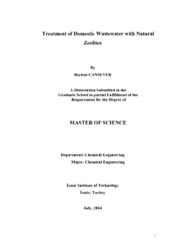Please use this identifier to cite or link to this item:
https://hdl.handle.net/11147/3288| Title: | Treatment of Domestic Wastewater With Natural Zeolites | Authors: | Cansever, Beyhan | Advisors: | Ülkü, Semra | Publisher: | Izmir Institute of Technology | Abstract: | In this study, the use of Gördes natural zeolite for removing NH4+ ion from wastewater effluent and from NH4Cl solution was investigated under various conditions. The effect of the solid:solution ratio, initial concentration of the solution, presence of competing cation, particle size of the clinoptilolite sample on ammonium ion removal capacity were studied. Highest amount of ammonium removal per gram zeolite was found in the solution having 1% solid: solution ratio. The experimental results indicate that the NH4+ exchange capacity is not dependent on the particle size of the clinoptilolite sample. Increasing the initial concentration increases the NH4+ uptake capacity. NH4+ removal decreases with increasing the initial ammonium concentration. For instance, the higher NH4+ ion concentrations show the 30.5-55 % removal and lower NH4+ ion concentrations lead to 87-95 % removal for pure ammonium chloride solution. The presence of potassium ion had the most significant effect upon ammonium ion uptake, followed by calcium ion. Magnesium ion had the least effect.Equilibrium data obtained have been found to fit both Langmuir and Freundlich models. The Langmuir model provided excellent equilibrium data fitting (R2>0.995). From the plateau of the isotherms maximum exchange capacities were determined as 9.03, 8.76, 8.695 and 7.84 mg NH4+/gr for NH4+, NH4+-Mg+2, NH4+-Ca+2and NH4+-K+, respectively. As a consequence of this result, the ammonium capacity of Gördes clinoptilolite was approximately 0.51meq/gr for pure ammonium chloride solution. When comparing the removal of NH4+ ion from wastewater effluent and from NH4Cl, the percent removal and the uptake capacity were lower for wastewater than for NH4Cl for same solid: solution ratio and the same initial concentration. It is expected that in domestic wastewater, where the complexity of the system is high, several matter could influence the removal of specific target cations. The decreased ammonium removal for wastewater may be attributed to by the existence of several matters (suspended solid, organic matter) in the wastewater effluent samples, which reduce the ammonium exchange capacity.experimental results indicate a significant potential for the Gördes clinoptilolite rich mineral as an ion exchange material for wastewater treatment and water reuse application. | Description: | Thesis (Master)--Izmir Institute of Technology, Chemical Engineering, Izmir, 2004 Includes bibliographical references (leaves: 96) Text in English; Abstract: Turkish and English xvii, 123 leaves |
URI: | http://hdl.handle.net/11147/3288 |
| Appears in Collections: | Master Degree / Yüksek Lisans Tezleri |
Files in This Item:
| File | Description | Size | Format | |
|---|---|---|---|---|
| T000456.pdf | MasterThesis | 2.34 MB | Adobe PDF |  View/Open |
CORE Recommender
Page view(s)
152
checked on Apr 28, 2025
Download(s)
102
checked on Apr 28, 2025
Google ScholarTM
Check
Items in GCRIS Repository are protected by copyright, with all rights reserved, unless otherwise indicated.